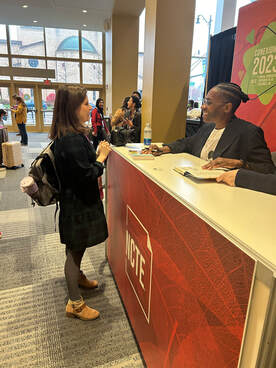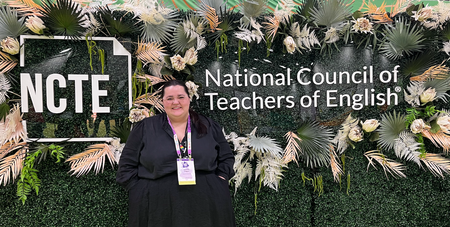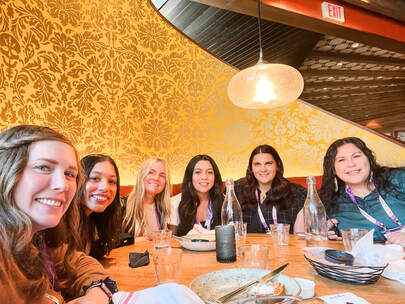By Callie Hammond, Jennifer Slagus, and Liz Thackeray NelsonThe NCTE Annual Convention is always an excellent time to learn from and connect with other scholars and teachers. From the vast number of session, workshop, and keynote offerings, there is truly something for everyone. In this post, we highlight several reflections on the conference from current doctoral students and an early-career professor. Callie HammondAlthough I have been an English educator for nine years, the 2023 NCTE conference in Columbus was my first time attending. I can honestly say that it exceeded all of my wildest expectations! I am grateful to the Children’s Literature Assembly for their support through the Vivian Yenika-Agbaw Student Conference Grant which allowed me to attend.
Walking into the exhibition hall where the various vendors and publishers were set up was like English teacher heaven, and although I picked up many books, perhaps the best part was just walking through the hall and being part of the excitement. Even better than the exhibition hall, though, were the various sessions that I was able to attend. I attended sessions ranging from creating new programs for preservice English teachers, to utilizing YA and picturebooks as supplements and complements to the traditional canon, to a panel discussion on advocating for Jewish literature, and even had the opportunity to meet Jacqueline Woodson after her keynote address. I was also able to present some of my own research in a round table with my colleague, Amber Moore, about utilizing classroom texts as a way to bear witness to tragedy. The week ended on a fabulous note with the CLA’s annual breakfast where Traci Sorell, whose book Indian No More was my true introduction to Native American literature, inspired everyone with her recent work, Mascot, about a group of students who stand up against a racist mascot. I was left inspired by NCTE and CLA and am looking forward to attending again! Jennifer SlagusAs an NCTE first-timer, there are so many interesting and inspiriting artifacts I have brought back—infused in my thoughts and praxis—which have already impacted my doctoral research and librarianship. CLA made that possible; as I was a recipient of a Vivian Yenika-Agbaw Student Conference Grant which enabled my attendance and offered access to those invaluable insights and new connections. Among all the positives, two takeaways impacted me most:
First, I met and learned from three scholars—Dr. Ebony Elizabeth Thomas, Dr. Amy Stornaiuolo, and Dr. Josh Coleman (recipient of the 2023 CLA Research Award and CLA Early Career Award)—whose work has shaped my dissertation on restorying neurodivergence in middle grade fiction. In their panel we discussed creating a restorying network and research community which I greatly look forward to! Second, NCTE reinspired me to conduct a research project I have thought about for over two years. I was thrilled to attend multiple panels centering neurodivergent and disabled authors and educators. Throughout I heard mentions of editorial feedback claiming neurodivergent characters are “unlikable,” among other stereotyped critiques. That is exactly what others mentioned on my scholarly podcast In the MIDst: A Kid’s Lit Podcast. Since leaving Columbus, I have begun developing a survey/interview study to document the voices of neurodivergent authors as they move through publishing in the post-#OwnVoices landscape. Since no other scholar is researching this, I know I need to; and I thank CLA and NCTE for the encouragement. Liz Thackeray NelsonThis year marks my 11th NCTE Annual Convention, but only my second conference in my role as an assistant professor, and my first conference bringing undergraduate students to present. As I reflect on my experiences at previous conferences, I can see how this form of connected learning has shaped my pedagogy and influenced my academic trajectory. In my early years of attending the conference, I brought back ideas for integrating multimodal literacies into my classroom, using diverse children’s and young adult literature to motivate students’ reading, and innovative ways for teaching writing. As I both attended and presented at the conference, I grew as a teacher and a scholar, making a doctoral program a natural next step. Attending the conference during grad school, shifted my focus to more research-based sessions related to children’s and young adult literature and writing, helping me to see how my own questions and ideas fit into the larger academic conversations in the field. During grad school, I was also introduced to a network of mentors and colleagues in CLA, which has also given me opportunities to participate in a larger community that advocates for children’s literature.
In my current role as a teacher educator, my focus has slightly shifted once again. While I am still interested in sessions describing effective pedagogy in K-12 classrooms, I am also interested in sessions focused on preparing preservice teachers. During the conference this year, I attended sessions that explored how teacher educators are using young adult literature with preservice teachers to foster conversations about race and anti-racist teaching and sessions that discussed how teacher educators are designing methods courses and implementing assignments to push preservice teachers to develop critical literacy and reflective teaching practices. While the sessions I attended were enlightening, connecting with colleagues was rejuvenating, and getting several books signed in the exhibit hall was exhilarating, perhaps the most rewarding part of the conference was watching my undergraduate students present and discussing their learning from the conference. Two students reflected on the power they felt when they attended a session on centering indigenous voices that included a healing tiles activity; another student relished the opportunity to meet Katherine Applegate, one of her favorite childhood authors; and all five informed me that they have already looked up potential Airbnbs in Boston for next year’s convention. I hope their induction to the NCTE community is as rewarding as mine was and continues to be. Callie Hammond is a doctoral student at North Carolina State University and a recipient of the Vivian Yenika-Agbaw Student Conference Grant. Jennifer Slagus (they/she) is a doctoral candidate at Brock University in Ontario, Canada and Coordinator of Research & Instruction at the University of South Florida Libraries. They are the Chair of the CLA Student Committee and a recipient of the Vivian Yenika-Agbaw Student Conference Grant. Liz Thackeray Nelson is an assistant professor of English Education at Utah Valley University and the chair of the CLA Membership Committee. |
Authors:
|
CLA
About CLA
|
Journal of Children's Literature
Write for JCL
|
ResourcesCLA-sponsored NCTE Position Statements
|
Members-Only Content
CLA Video Library
|
© COPYRIGHT 2018.
ALL RIGHTS RESERVED |




 RSS Feed
RSS Feed